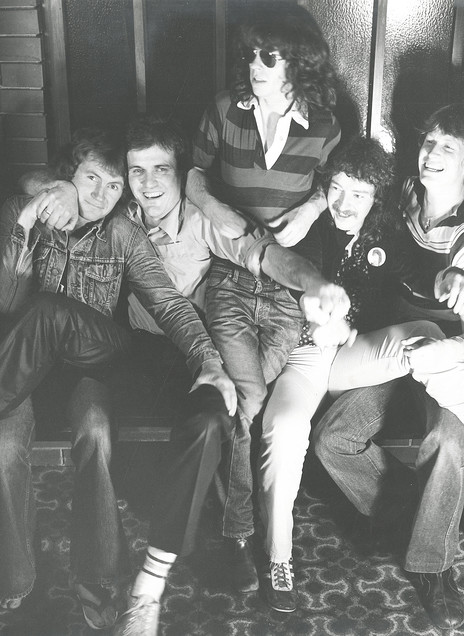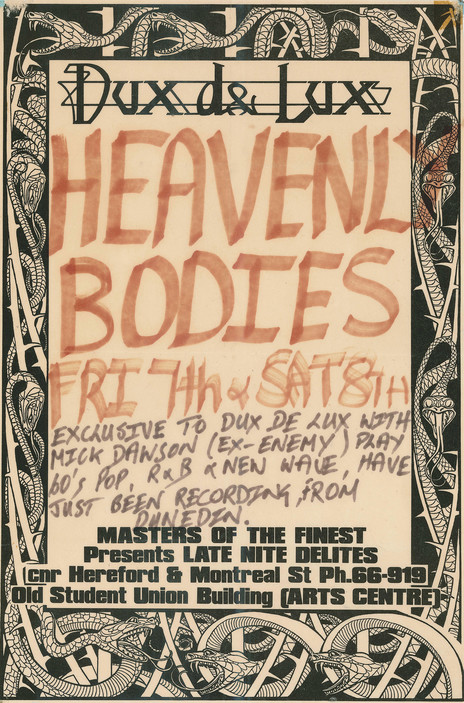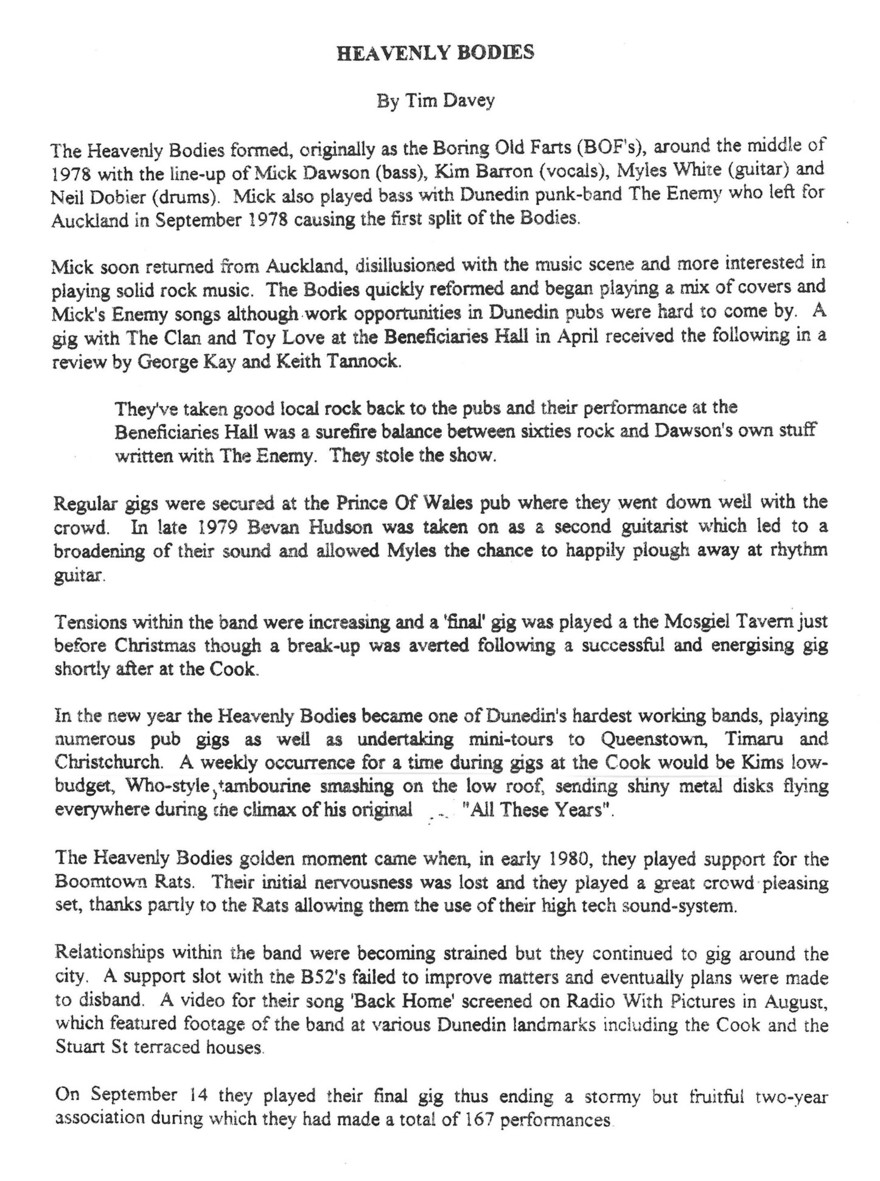
Mick Dawson's band Heavenly Bodies, post The Enemy (L-R): Bevan Hudson, Mick Dawson, Kim Barron, Neil Dobier, Myles White - Photo by Pat O'Neill
--
From Rip It Up Extra issue two, December 1980.
On Saturday, 14 September 1980, Dunedin’s foremost rock’n’roll combo, The Heavenly Bodies, ended a stormy two-year career. Mick Dawson (bass), Kim Barron (vocals), Myles White (guitar), Bevan Hudson (guitar) and Neil Dobier (drums) had been pouring out the best live pub rock available on the mainland and their demise has been a sore loss to anyone interested in kicking ass.
But let’s backtrack even further.

Heavenly Bodies - publicity image from Kim Barron Collection
Coronation Hall is your usual all-purpose community centre situated in one of Dunedin’s respectable streets, and it was there back in 78 that The Bodies, then also known as the BOF’s (Boring Old Farts), supported and destroyed The Enemy in their last gig before leaving for Auckland. At that time Mick was playing with both The Enemy and the Bodies and he left for Auckland with Chris Knox and co., causing the first Heavenly Bodies’ split.
The Enemy invasion of Auckland is now history, but it was an anti-climax for Mick as he failed to adjust to the change of scene and became increasingly embarrassed by the band’s scrappy sound and Knox’s on-stage theatrics. So it wasn’t too long before he reappeared in Dunedin and reactivated the Bodies.

How this article first appeared in Rip It Up Extra #2, December 1980. The illustration is by Chris Knox.
Intensive rehearsals followed where the band re-energised some of Mick’s Enemy songs and built up an impressive selection of new originals and British rock classics. But times were hard, and work was difficult to come by, especially at The Cook, where there was a kickback against The Enemy days – so Mick’s past connections threatened the Bodies’ chances of a local breakthrough.
Eventually gigs were secured at the Prince of Wales, where they went down well with the crowd but alienated the management with their natural rock’n’roll volume. This was ironic as both Dawson and Barron were from folk-music backgrounds and were virtually anti-volume.

Heavenly Bodies - publicity images from Kim Barron Collection
By late 79 guitarist Bevan Hudson (background fortunately unknown) had been recruited to broaden the sound and to give Myles more freedom to excel in the Bodies’ trademark of beefed-up rhythm guitar.
With Hudson in tow, but not because of his addition, things started to look up for the band, especially when acting manager Keith Tannock arranged a series of dates at the Cook, Dunedin’s make-or-break pub. They made it and work picked up with the result that they became the hardest-working, straightest-shooting no-bullshit band on the pub circuit.

Poster for a "teenage rock dance" featuring Heavenly Bodies, 18 May 1979. - Kim Barron Collection
Just before Christmas 1979, musical and personal differences almost resulting in blows prompted a second split and a final gig was planned for the Mosgiel Tavern. Tannock and well-known rock’n’roll aficionado Jeff Ruston were counting on this gig to pull the band together, but the Bodies were given their marching orders for playing at excess volume. Their gear was only turned up to quarter level. Only a last-minute raging one-nighter at the Cook saved the band from the second Heavenly Bodies’ split.
Their differences were resolved, thanks mainly to dollar commitments, and the band in 1980 embarked on a new, if strained, golden era. Mini tours were arranged to Queenstown, Timaru, and the Gladstone and Hillsborough in Christchurch, and they proved to be the most popular band with the crowd at 4XO’s Battle of the Bands in January, but had to settle for third place.

Heavenly Bodies at the Captain Cook Hotel, c. 1979. - Kim Barron Collection
The highlight of their career, however, was their support of The Boomtown Rats at the Town Hall, a gig again arranged by Tannock’s wheeling and dealing. The Bodies were little short of monumental that night thanks in part to the Rats’ generous attitude in letting the band use their sound man. Many thought they blew Geldof and his lot clean out the nearest exit. And that’s not too far from true.
There was little hope of the band re-igniting as, from that point on, everything was collapsing and, even though they were booked well in advance, another final date had been set but this time it was for real. New original songs and a support slot with the B-52’s, albeit an indifferent performance by the Bodies, couldn’t prevent the split itself amidst on-stage barnies – a sad end to a band who realised too late that they had won a significant following.
Heavenly Bodies, in a local sense, embodied the spirit of rock’n’roll and they provided a bridge between the ageless chestnuts of the sixties with the vital contemporary energy of the moment. This was reflected in their own excellent material with songs like ‘Jealousy’, ‘All These Years’, ‘Sophisticated’, ‘By the Sea’, ‘Inside Out’ and ‘You’re So Foolish’, which have been recorded, along with others, on a tape of suspect quality. That is the sum total of the band’s recorded achievements, as low horizons, internal clashes and general off-stage lethargy prevented the Bodies from real advancements.

The Dux De Lux, Christchurch presents Heavenly Bodies, shortly after the band's recording sessions, March 1980. - Kim Barron Collection
Arguments over sound levels and repertoire resulted in irreparable rifts in the band and in the last six months of their existence they often played with at least one member off stage, with Neil Dobier the only constant factor.
Perhaps greater determination and a willingness to compromise their egos for the interests of the band may have led them to some sort of success and wider recognition. But they’ve left behind a whole bunch of great rock’n’roll memories, and for those we should be grateful.
Don’t wanna be hip
But thanks for the great trip.
(‘Saturday Night Gigs’, Mott the Hoople)
--
From Rip It Up Extra issue two, December 1980; republished with permission.

A posthumous press release about Heavenly Bodies, by Tim Davey
--
Kim Barron writes, 2022: “Bands we played with, or supported, include The Double Happys, Flying Backwards, The Vauxhalls, The Clean, Shuffle, Red Tape, The Features, The Gordons, The Knobz/Rocklox, Feedback, Tibet, Toy Love, B-52’s, Boomtown Rats, etc.
“Our first paid gig was with The Enemy at the Joy Boy in Invercargill, an upstairs venue, a pool table bar, you get the picture; Mick playing bass with both bands. Knox did his usual attention-seeking behaviour cutting his arm & hitting the front row with blood. A lot of the boyz thought that was disrespecting the sheilas present. The Manager had to advise us to stay the night where we were so we did, sleeping on pool tables, the floor etc. I had to ring my wife staying in Dipton to say ‘I’m not coming home … etc.’ That was 1978; we had played a few practice room gigs with the Enemy.
“I wrote several songs, such as ‘Inside Out’, ‘Wall of Sound’, and ‘All These Years’. The latter had the line ‘I saw your face I won’t forget’, which audience members sang back as ‘arse on your face I won’t forget’. ‘Jealousy’ was written by Mick [Dawson] and me, although he told me yesterday he fucked it up when he became involved. (Not true.) Mick used to hang out a lot and polish up or add a middle eight, etc, and a few more were co-written with Mick, although things get confused in a band as to who did what, eg, Mick in the Enemy/Toy Love days, ‘Don’t Catch Fire’.
“As for on-stage fighting: maybe the odd guitarist leaving the stage for twiddling too much, or playing ‘Hey Hey My My’. (Mike Dooley played drums on this at a Chinese end-of-year social club do we played at, after Toy Love at the Cook.) No fisticuffs ever! Bickering maybe …
“I also loved our version of ‘I Hear You Knocking’, Dave Edmunds-style, dropped because Kay didn’t like it in a review, I blamed Roi Colbert for years not him!
“Most of the stuff I sent you comes from a scrapbook I kept which I narrated in the third person: ‘Mick depressed with the sound, good night though,’ ‘Hillsborough ChCh, Kim’s voice stuffed,’ etc. I should write a book, The Cover Band That Could Have Made It.
“Mick thought we were getting pretty good when we broke up. Simon Grigg offered to sign us at one stage for a Propeller EP, I think. We recorded three songs for TVNZ, they chose ‘Back Home’ which Karyn Hay introduced on RWP. ‘You’re So Foolish’ appears on the three-CD compilation “... but I can write songs okay”, a Yellow Eye release of 40 years of Dunedin music (1996). Both Mick’s songs.”